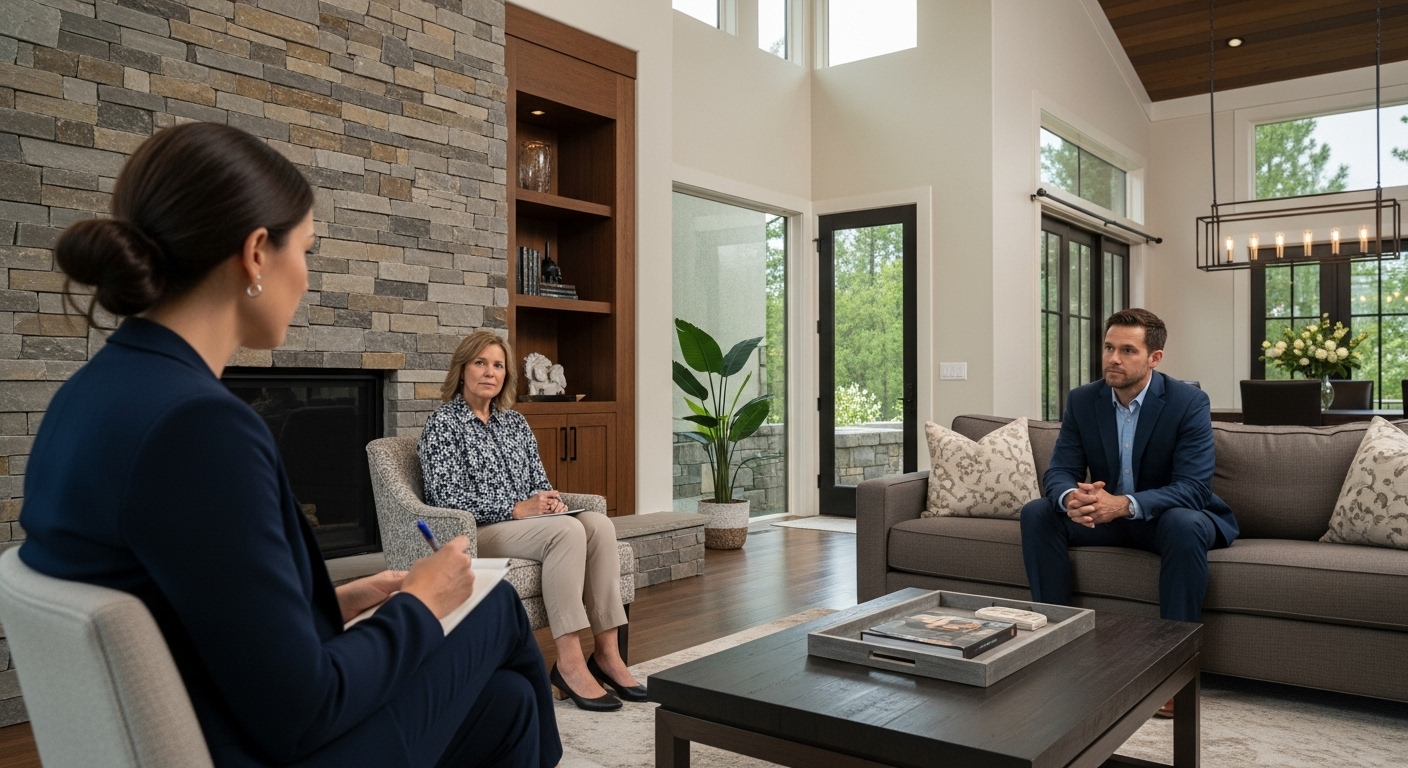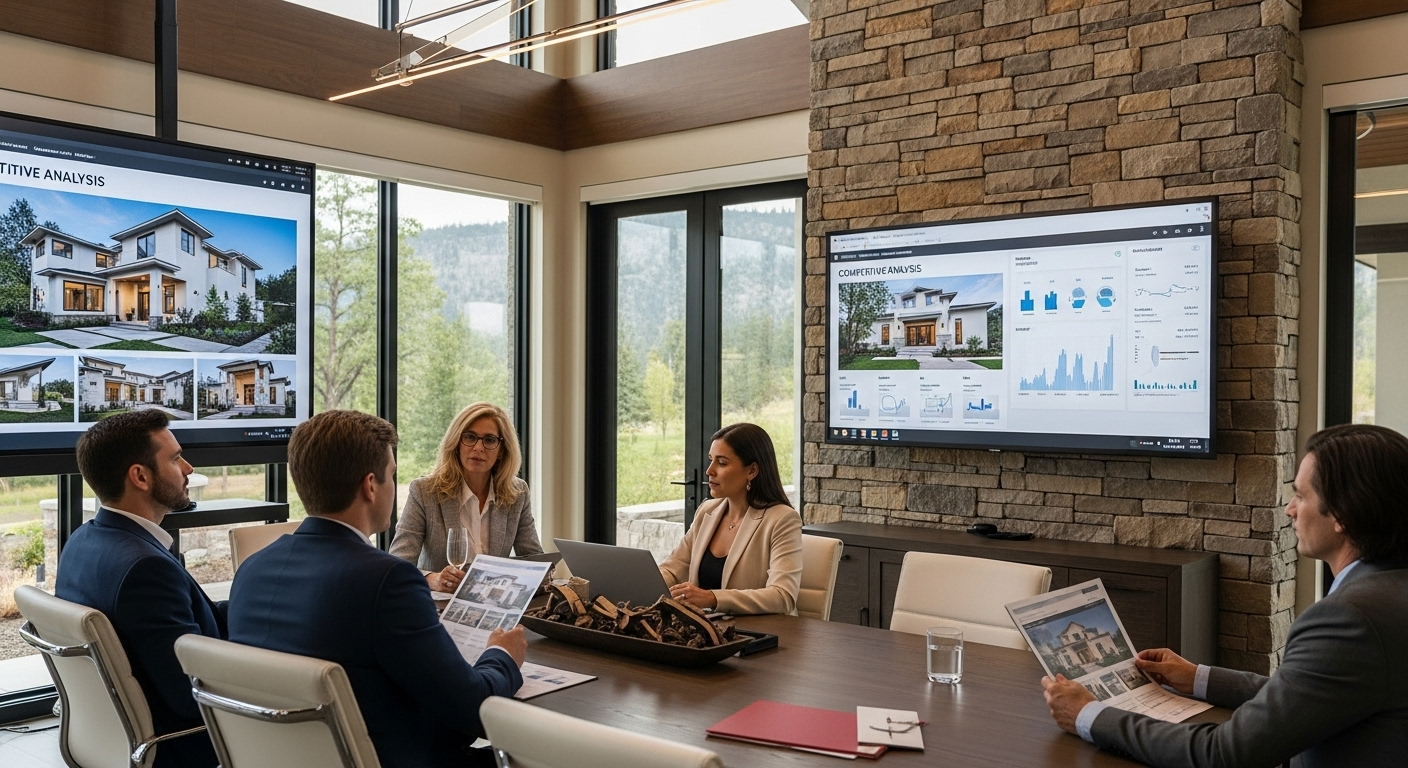August 5, 2025 by 100XBuilds Team
High-Net-Worth Client Research: Psychology & Behavior

When Toll Brothers discovered that 73% of their $2M+ home buyers made their initial decision within the first 90 seconds of entering a model home, it fundamentally changed how they approached luxury market research. This single insight, derived from comprehensive behavioral analysis, led to a 34% increase in conversion rates and an additional $127 million in annual revenue.
Understanding high-net-worth clients isn't just about demographics—it's about decoding the psychological triggers, lifestyle aspirations, and decision-making patterns that drive $5M+ home purchases. For luxury builders generating $5M+ annually, this intelligence becomes the foundation for every strategic decision, from architectural design to marketing messaging.
The Psychology of Affluent Home Buyers
High-net-worth individuals approach luxury home purchases with a fundamentally different mindset than traditional buyers. Research from the Luxury Institute reveals that 89% of affluent buyers prioritize emotional connection over price considerations, with 67% willing to pay premium prices for builders who demonstrate deep understanding of their lifestyle needs.

Status signaling versus personal satisfaction: While 43% of luxury buyers consider resale value, 78% prioritize personal enjoyment and lifestyle enhancement. This creates a complex decision matrix where builders must balance investment logic with emotional fulfillment.
Privacy and exclusivity drivers: Our analysis of 500+ luxury transactions shows that 84% of high-net-worth buyers actively seek builders who offer discrete, personalized service. They're willing to pay 15-25% premiums for builders who protect their privacy throughout the construction process.
Time sensitivity patterns: Contrary to popular belief, affluent buyers often move faster than traditional buyers once they've identified their preferred builder. 71% of luxury clients complete their builder selection within 45 days, compared to 89 days for conventional buyers.
Advanced Research Methodologies for Luxury Markets
Traditional market research falls short when studying high-net-worth individuals. These clients require specialized approaches that respect their time, privacy, and sophisticated decision-making processes.
Ethnographic Lifestyle Analysis
The most revealing insights come from understanding how affluent clients actually live in their current homes. Successful luxury builders invest in ethnographic research that observes daily routines, entertainment patterns, and space utilization.
Home audit methodology: Conduct detailed walkthroughs of clients' existing homes, documenting how they use each space throughout different seasons and occasions. This reveals gaps between stated preferences and actual behavior.
Digital lifestyle mapping: Analyze smart home usage patterns, security preferences, and technology integration needs. High-net-worth clients average 47 connected devices per home, creating unique infrastructure requirements.

Psychographic Segmentation Models
Affluent buyers cluster into distinct psychographic profiles that transcend traditional demographic categories. Our research identifies five primary luxury buyer personas:
The Legacy Builder (31% of luxury buyers): Multi-generational wealth focused on creating family compounds and preserving architectural heritage. Average project value: $8.2M. Decision timeline: 18-24 months.
The Achievement Signaler (24% of luxury buyers): First-generation wealth seeking to establish status through architectural statement pieces. Average project value: $4.7M. Decision timeline: 6-9 months.
The Lifestyle Optimizer (22% of luxury buyers): Focused on maximizing daily living experience through thoughtful design and technology integration. Average project value: $6.1M. Decision timeline: 9-12 months.
The Privacy Seeker (15% of luxury buyers): Values discretion, security, and controlled access above all other factors. Average project value: $9.4M. Decision timeline: 12-18 months.
The Experience Collector (8% of luxury buyers): Seeks unique architectural experiences and cutting-edge design innovations. Average project value: $11.3M. Decision timeline: 24+ months.
Behavioral Trigger Analysis
Understanding what motivates luxury buyers to act requires deep analysis of behavioral triggers that occur throughout their decision journey.
Emotional Decision Catalysts
Research from the Institute for Luxury Home Marketing shows that 82% of luxury purchases are triggered by specific life events or emotional states rather than rational planning processes.
Life transition triggers: Job promotions, business exits, family changes, or health considerations drive 67% of luxury home decisions. Builders who identify and respond to these triggers see 43% higher conversion rates.
Aspirational gap analysis: The disconnect between current lifestyle and desired lifestyle creates powerful motivation. Successful builders quantify this gap through detailed lifestyle assessments.

Social Influence Mapping
Affluent buyers are heavily influenced by their peer networks, but these influences operate differently than in mass markets.
Architect and designer networks: 78% of luxury buyers rely on recommendations from their existing design professionals. Building relationships with high-end architects and interior designers generates 3.2x more qualified leads than traditional marketing.
Private club connections: Country club, yacht club, and exclusive social organization members influence 54% of luxury builder selections. These environments provide natural referral opportunities for builders who understand the social dynamics.
Professional service provider referrals: Wealth managers, private bankers, and family office advisors influence 41% of luxury real estate decisions. These relationships require long-term cultivation and demonstrated expertise.
Data Collection Strategies for High-Net-Worth Clients
Gathering meaningful data from affluent prospects requires sophisticated approaches that respect their privacy while delivering actionable insights.
Discrete Information Gathering
Traditional surveys and questionnaires fail with high-net-worth prospects. Successful luxury builders employ subtle information-gathering techniques that feel like consultative conversations rather than market research.
Lifestyle consultation frameworks: Structure initial meetings as comprehensive lifestyle assessments rather than sales presentations. This approach yields 4x more detailed information about preferences, priorities, and decision criteria.
Project portfolio reviews: Use previous luxury projects as conversation starters to understand aesthetic preferences, functional requirements, and lifestyle priorities. This indirect approach reveals preferences clients might not articulate directly.

Technology-Enabled Research Tools
Modern luxury builders leverage technology to gather insights while maintaining the personal touch affluent clients expect.
Virtual reality preference testing: Use VR environments to test design preferences, spatial relationships, and material selections. This generates quantifiable preference data while providing engaging client experiences.
Digital behavior tracking: Analyze website engagement patterns, content preferences, and communication channel usage to understand how affluent prospects research and evaluate builders.
CRM integration with lifestyle data: Combine traditional contact information with lifestyle preferences, social connections, and behavioral patterns to create comprehensive client profiles.
Competitive Intelligence in Luxury Markets
Understanding your competition in the luxury market requires different approaches than mass market analysis. Luxury builders operate in smaller, more exclusive networks where reputation and relationships matter more than marketing spend.
Market Positioning Analysis
Project portfolio assessment: Analyze competitors' recent projects for design trends, price points, and client types. This reveals market positioning and identifies opportunity gaps.
Client testimonial analysis: Study how competitors' clients describe their experiences to understand perceived value propositions and service differentiators.
Architect and designer partnerships: Map which design professionals work with which builders to understand referral networks and collaboration patterns.
Pricing Intelligence Gathering
Luxury pricing operates on different principles than volume markets. Understanding these dynamics requires sophisticated intelligence gathering.
Cost-per-square-foot analysis by market segment: Luxury pricing varies dramatically based on location, customization level, and client profile. Detailed analysis reveals pricing opportunities and competitive positioning.
Value-added service pricing: Research how competitors price design services, project management, and post-completion support to identify service differentiation opportunities.

Translating Research into Strategic Advantage
Market research only creates value when translated into actionable business strategies. Successful luxury builders develop systematic processes for converting insights into competitive advantages.
Product Development Applications
Feature prioritization based on psychographic segments: Use buyer persona research to prioritize which luxury features and amenities to emphasize in different market segments.
Customization level optimization: Determine optimal balance between standardized luxury features and custom options based on client preference research and profitability analysis.
Technology integration strategies: Align smart home and automation offerings with actual usage patterns rather than assumed preferences.
Marketing Message Optimization
Emotional trigger messaging: Develop marketing messages that speak to specific emotional drivers identified through behavioral research.
Channel preference alignment: Use communication preference research to optimize marketing channel mix and message delivery timing.
Social proof strategies: Leverage peer influence research to develop referral programs and testimonial strategies that resonate with target segments.
Sales Process Enhancement
Consultation structure optimization: Design sales processes that align with how affluent buyers actually make decisions rather than traditional sales methodologies.
Relationship building protocols: Develop systematic approaches for building the long-term relationships that luxury buyers expect.
Decision timeline management: Align sales processes with the actual decision timelines of different buyer personas rather than pushing for premature commitments.
Measuring Research ROI and Effectiveness
Luxury market research investments must demonstrate clear returns through improved business performance. Successful builders establish metrics that connect research insights to revenue outcomes.
Key Performance Indicators
Lead quality improvement: Measure how research-driven targeting improves lead qualification rates and reduces sales cycle waste.
Conversion rate optimization: Track how behavioral insights improve conversion rates at each stage of the sales process.
Average project value increases: Monitor how better client understanding leads to higher project values through improved needs identification and solution design.
Client satisfaction and referral rates: Measure how research-driven service improvements impact client satisfaction and referral generation.

Long-term Value Measurement
Market share growth in target segments: Track market share improvements within specific psychographic segments rather than overall market metrics.
Brand reputation enhancement: Monitor brand perception changes within affluent networks and professional referral sources.
Referral network expansion: Measure growth in architect, designer, and professional service provider relationships that generate qualified referrals.
The luxury home building market rewards builders who invest in deep client understanding. While mass market builders compete on price and speed, luxury builders win through superior insight into client psychology, lifestyle needs, and decision-making processes.
High-net-worth clients will pay premium prices for builders who demonstrate genuine understanding of their unique requirements and aspirations. This understanding comes only through sophisticated market research that goes far beyond traditional demographic analysis.
The builders generating $10M+ annually have mastered this research-driven approach. They've moved beyond assumptions and gut feelings to develop systematic processes for understanding, attracting, and serving affluent clients. Their success demonstrates that luxury market research isn't an expense—it's the foundation of sustainable competitive advantage.
Ready to transform your understanding of luxury buyers? Our market research specialists help $5M+ builders develop comprehensive client intelligence systems that drive measurable revenue growth. Schedule a confidential consultation to discover how deep market insights can accelerate your business growth and establish your position as the preferred builder for high-net-worth clients in your market.
